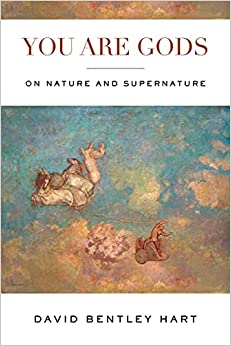During Eastertide (and probably throughout the summer), I am reading through David Bentley Hart’s You Are Gods. The title comes from Jesus’ quotation of Psalm 82 in defense of his calling himself the “son of God.” John 10:34. The word used for “gods” in Psalm 82:6 is “elohim” which is, of course, the word translated as “God” throughout the Hebrew Scriptures. The book is a collection of six essays where Hart dispels the understanding that orthodox Christianity teaches (or can teach) a two-tier understanding of nature and supernature. Rather, Christianity teaches that nature/supernature or nature/grace are indivisible. Whatever possesses a supernatural destiny must be supernatural – must be divine – naturally and whatever enters into the life of the divine must always already have been divine. As Hart previously wrote in That All Shall Be Saved, protology and eschatology are but a single inquiry since in the end of all things is their beginning. p.68.
Within these essays, Hart asserts five propositions that are grounded within orthodox Christian ontology:
1. The sole sufficient natural end of all spiritual creatures is the supernatural, and grace is nothing but the necessary liberation of all creatures for the natural ends.
2. Nature itself has no real existence and can have none; it is entirely an ontological patiency before the formal causality of supernature, and only as grace can nature possess any actuality at all.
3. No spiritual creature could fail to achieve its naturally supernatural end unless God were the direct moral cause of evil in that creature, which is impossible. Conversely, God saves creatures by removing extrinsic, physical (that is, non-moral) impediments to their natural union with him.
4. God became human so that humans should become God. Only the God who is always already human can become human. Only a humanity that is always already divine can become God.
5. God is all that there is. Whatever is not God exists as becoming divine, and as such is God in the mode of what is other than God. But God is not “the other” of anything.
My goal is to write a brief review of each portion of each essay in order to provide an overall review of the work itself and (maybe more) an overall review of myself. The occasion for Hart’s book is his rejection of the recurrence of certain early modern Thomistic understandings of nature and supernature. I lack any first-hand knowledge of Hart’s foil, and will not engage in the direct arguments he makes against his foes because I do not understand their position. However, the propositions that Hart does present are grounded firmly within the Christian tradition and particularly with the church of Late Antiquity (Nyssa, Maximus, et.al.). It is for this reason that I find this book of great interest.

